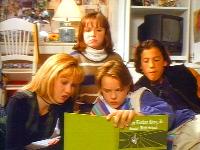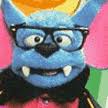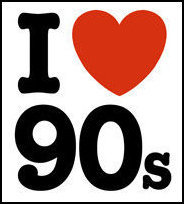 Were you forced to attend summer camp against your will? Have access to your parents' designated camp fees? Know a burned-out ex-hippie drama teacher known for evading his financial obligations? Enjoy reckless scheming?
Were you forced to attend summer camp against your will? Have access to your parents' designated camp fees? Know a burned-out ex-hippie drama teacher known for evading his financial obligations? Enjoy reckless scheming?Well, have I got the movie for you.
Camp Nowhere was every preteen's dream in the 90s. It was like Home Alone, except...well, it was a lot like Home Alone. It seems they even used the same freelance movie-title selection company as each title follows a simple formula; (Location) (Word Describing Isolated Situation). Regardless of the obvious comparison, Camp Nowhere had a slightly different, older appeal. Sure, it had an equal amount of screen time devoted to showcasing frenzied adult-free debauchery, but the kids of Camp Nowhere had multifaceted teen-style relationships and were fond of fooling their next-of-kin in lieu anonymously evil robbers.
As evidenced in the DVD cover pictured above, it got some pretty detailed rave reviews. Everyone loves a good one-word summary. When I'm at the video store, I usually only have one-tenth of a second to make a decision, so I appreciate them helping me out with the telling "Funny!" review on the front. In actuality, the reviewer could have hidden "Not Funny!" somewhere in their 500+ word review and the quote could have been clipped in the same way. Intrigued by the seemingly intentional vagueness of the pulled quote, I felt I had to do it justice and look up the original NY times review (found here). The word "Funny!" does indeed appear, but minus the exclamatory punctuation and 112 words into the cleverly titled "Suppose We Rent Some Cabins and Run Our Own Camp?" review. But hey, it's in there.
The movie begins with our winsome protagonist, Morris "Mud" Himmel. See, can't you already tell the movie is going to be hilarious? I mean, they call him Mud. Mud! Like dirt, but with water. Pure comedy gold. So anyway, Mud's parents are some class of evil villain and want to send him to the dreaded computer-learning summer destination Camp Micro-chippewa. Get it? Micro-chippewa. Microchip? Computers? I hope you're still following, this is pretty complicated stuff we're dealing with here. Lucky for our friend Mud, all of his convenient movie-character-cliché friends are in the exact same situation. Each of them is inauspiciously fated for some random, unlikely summer camp and can't stand the thought of it. What's a gang of improbable pals to do?

It's pretty clear that there is only one answer to this question, and no, it is not the real-life just-suck-it-up-and-deal-with-it solution. What these kids really need is to start their own camp! Infuriated at their parents' propensity to send them to such loathsome summer getaways as Fat Camp, Drama Camp, and Military Camp, the kids forge ahead to found a summer camp of their own. But, wait, you ask. What of the location? The food? The financial backing?
Totally taken care of. These are smart kids here; after all, the Himmels wouldn't be sending Mud to computer camp if he weren't destined for academic greatness. Enter Dennis Van Welker, high school drama teacher extraordinaire and adult co-conspirator in Operation Camp Nowhere. The Camp was indeed somewhere, so maybe the name was just to throw off suspicious onlookers. Finding a handily available abandoned summer camp site, the kids get to work on the aforementioned reckless scheming. They realize that if they brought in other kids and somehow sold the concept to parents as a real camp, they could get those sweet, sweet camp entry fees and let some pretty wild high-jinks ensue.
Like any good 90s movie, this film is ripe with cheesy montages. Watch the kids throw pies at one another and propel themselves off the cabin roof onto a pile of mattresses to a background beat of rockin', fun-loving music! Despite the abundance of semi-standard 90s montage sequences, the film is actually relatively witty, if a bit tired in its premise. Not to mention that with dreamboats like Jonathan Jackson and Andrew Keegan at the helm, there was certainly no shortage of tween eye candy. It also debuted a young Jessica Alba, for those of you who are into that kind of thing. All in all, the film really covered its BOP! magazine fan base.
To attest to the funniness of this film, here is the theatrical trailer. I apologize for the atrocious quality of the clip, but the preview sums up the film neatly and hilariously:
Of course, no kid movie would be complete without some sort of ridiculous come-to-a-head situation and eventual unraveling of the master plan. If you're not one for spoilers, you may want to scroll down now. The kids' plan appears to miraculously be working; the campers are happy, the lied-to parents are satisfied with their thin explanations, and Dennis is acting as a loosely-defined adult. That is, until the parents insist that they have a visiting day. As you saw in the clip above, the kids and Dennis go to great lengths to continuously reform and rearrange their camp on a single day to satiate the different parents coming expecting to see a military base, a diet haven, a theater forum, or a computer class. Rather than explaining it in great detail, let me illustrate with a clip from the movie complete with amazing redecorating montage:
As expected, this euphoric sense of accomplishment and getting-away-with-it style glee can't last. These kids can't keep up the facade forever, and cracks begin to show on parents' day. As things eventually crash and burn, many lessons are learned and tough decisions are made, but as in all of these movies things turn out okay for everyone in the end and both the kids and Dennis are all the wiser for the experience. Sure, the movie conventions can be a little trite, but this film defined an emergent independent generation of 90s kids and gave them the power to dream of a world where they ran the show. Although the premise was exaggerated, we could all relate to their innocent-intentioned acts of rebellion in favor of standing up for being themselves.
If all of that isn't enough for you, the movie repositions Christopher Lloyd and Tom Wilson (Biff from the Back to the Future trilogy) as hippie vs. cop nemeses. If pitting them head to head once again fails to tickle your 90s fancy, then I don't know what will.
So next time someone tries to bring you down by saying you're going Nowhere, think of your beloved childhood camp based there and smile. Happy camping, children of the 90s.












